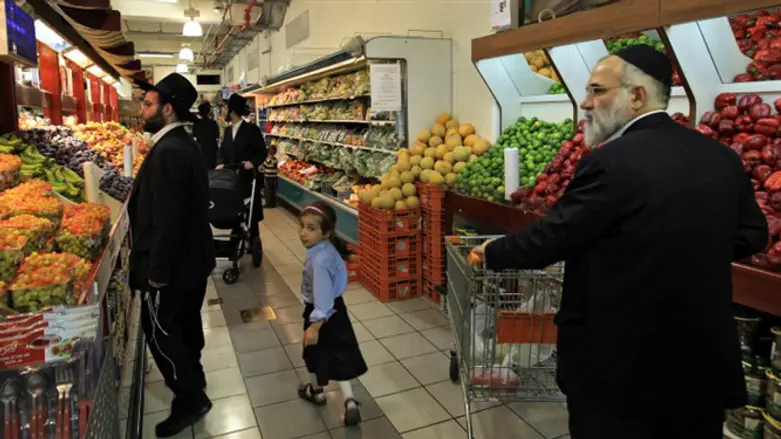
Welfare and Social Services Minister Haim Katz (Likud), working together with Chabad's Eshel Soup Kitchens in Jerusalem and Leket Israel, presented on Monday the National Initiative for Ensuring Nutrition.
The new initiative will provide food for tens of thousands of families who suffer from nutritional instability, providing them with a rechargeable 500 NIS "credit" card enabling them to buy food for that sum every month.
The program will be a one-year pilot program implemented in 36 localities, and will cost the Israeli government 60 million NIS.
Around Jewish holidays, needy families often receive food baskets, but these contain much less food for a much lower cost and do not help support the family in the long term. There are also charitable initiatives that provide weekly food packages for families on welfare lists, but they do not reach everyone in need and there is no personal choice of foods. The new initiative aims to provide families with food throughout the year.
The program will have a director, as well as coordinators for each area. Each area coordinator will be responsible for eight local coordinators, who are responsible for a specific town. The local coordinators will accept new families who have a referral from a Welfare Ministry social worker, and will verify each family's eligibility.
Each family accepted into the program will receive a card which allows them to buy 250 NIS worth of food (excluding alcohol and tobacco) at selected chain and local stores. The card will also allow them to buy 250 NIS worth of fruits, vegetables, and dried food from "food rescuers," organizations that prevent good food from being tossed in the garbage. The "rescued" food will be brought to the family's home.
Participating municipalities include: Ofakim, al-Batuf, Elad, Ariel, Baqa al-Gharbiyye, Beer Sheva, Beitar Illit, Jisr az-Zarqa, Dimona, Hagilboa, Hatzor HaGlilit, Yavne, Yeruham, Jerusalem, Kafr Manda, Kafr Qasim, Karmiel, Lakhish, Lakiya, Migdal Haemek, Modi'in Illit, Ma'alot-Tarshiha, Nahariya, Neve Midbar, Netivot, Immanuel, Isfiya, Afula, Tzfat, Kiryat Yam, Kiryat Malakhi, Rahat, Rechasim, Ramla, Sderot, and Tel Sheva.
"Today we are beginning a process which we hope will enable needy families to gain nutritional security during the entire year, in a respectable way," Katz said. "This is an initiative which will include all sectors of the population, from all over Israel: North, south, center, haredi, secular, Jews, and Arabs.
"I hope this initiative will succeed as expected, and that we will expand it to include more families from all over Israel."
Eshel Chairman Mendy Blau said, "As the oldest organization providing food for Israelis suffering from nutritional instability, I can verify that this is a true revolution. This is the first time there is a program with such a wide scope and organized properly. It is the first time there is a large, respectable program which functions respectfully and prioritizes the family receiving the assistance."
Leket Israel CEO Gidi Koruch said, "I applaud the Welfare Ministry's initiative, which deals with the problem of nutritional instability by providing families with food that otherwise would have gone to waste. Leket Israel distributes food to needy families on a regular basis, but thanks to this initiative and those behind it, we will manage to reach many more families who had not yet received the help they needed.
"I believe this initiative will succeed and expand, and we will be able to reach a greater number of families needing support."
The new program, similar to American "food stamps", does not restrict the purchase of junk food. The US estimates that $1.3 billion of food stamps are spent on junk food each year, often because junk is cheaper than healthy food.